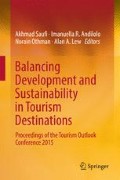Abstract
Lombok is one of the most Muslim-populated Islands of Indonesia and is entitled ‘island of a thousand mosques’. Such status may be one of the reasons behind the plan of Indonesian Government to develop Lombok as an Islamic (halal-friendly) tourist destination in Indonesia. This study is aimed at investigating the potentials of Lombok and its surroundings (a number of small islands or gilis around Lombok) to adopt the Islamic principles (followed to develop halal-friendly tourist destination) from the destination marketing perspectives. Data was collected from electronic and non-electronic promotional materials used by tourism agencies and private tourism enterprises (travel agents, hotels, and restaurants) in promoting Lombok and its surroundings. The data was then analyzed using content analysis approach. The study finds two main categories: (1) the potential halal-friendly tourist destinations, including all tourist destinations from within Lombok Island, and (2) the moderate halal-friendly tourist destinations, including the gilis. These findings suggest that the Islamic tourism principles can be adopted by all tourism enterprises in Lombok, and used to market Lombok as a halal-friendly tourist destination. However, such principles cannot be fully adopted by all tourism enterprises on the gilis. Instead, the halal-friendly tourism can be adopted by individual tourism enterprises and used as an individual market positioning on the gilis. The study brings implications to both tourism studies and management.
Access this chapter
Tax calculation will be finalised at checkout
Purchases are for personal use only
References
Abdullah JB, Hamali JH, Abdullah F (2013) Islamic marketing mix: the critical factors. In: Proceeding of 4th international conference on business and economic research, Bandung, Indonesia
A&T Holidays (2015) Lombok and beyond. www.lombokandbeyond.com. Retrieved on 17 Mar 2015
Battour M, Battor M, Bhatti MA (2014) Islamic attributes of destinations: construct development and measurement validation and their impact on tourist satisfaction. Int J Tourism Res 16:556–564
BPS NTB (2014) Nusa Tenggara Barat in Figures 2014. Mataram
Brokaj R (2014) Local Government’s role in the sustainable tourism development of a destination. Eur Sci J 10(31):103–117
Dahles H, Bras K (1999) Entrepreneurs in romance tourism in Indonesia. Ann Tourism Res 26(2):267–293
Dogan HZ (1989) Forms of adjustment sociocultural impacts of tourism. Ann Tourism Res 16:216–236
Elsamadicy AM, Negm EM (2013) Investigating the impact of the political change regarding the dominance of the Muslim brotherhood on tourists’ intentions to visit Egypt before the 2013 Regime alteration. Am Acad Sch Res J 5(6):34–45
Ghadami M (2012) The role of Islam in the tourism industry. Elixir Mgmt, Arts 52:11204–11209
Haq F, Wong HY (2010) Is spiritual tourism a new strategy for marketing Islam? J Islamic Mark 1(2):136–148
Henderson JC (2003) Managing tourism and Islam in Peninsular Malaysia. Tour Manag 24:447–456
Hussnain SA (2011) What is Islamic marketing. Global J Manage Bus Res 11(11):100–103
Jafari J, Scott N (2014) Muslim world and its tourism. Ann Tourism Res 44:1–19
Kavaratzis M, Ashworth G (2008) Place marketing: how did we get here and where are we going? J Plac Manag Dev 1 (2):150–165
Lombok.magazine (2015) Pink Beach. Lombok magazine No. 15 Feb–15 Mar, pp 16–17
Mayring P (2000) Qualitative content analysis, forum: qualitative social research, vol 1(2). http://www.qualitative-research.net/fqs/
Ries A, Trout J (1982) Positioning: the battle for your mind. Warner, New York
Sandikci O (2011) Researching Islamic marketing: past and future perspectives. J Islamic Mark 2(3):246–258
Saeed M, Azmi IBAG (2014) Religion and brand switching behaviour of Muslim consumers. Middle East J Sci Res 21(9):1611–1617
Saeed M, Ahmed ZU, Mukhtar SA (2001) International marketing ethics from an Islamic perspective: a value maximization approach. J Bus Ethics 32:127–142
Saufi A, O’Brien D, Wilkins H (2014) Inhibitors to host community participation in sustainable tourism development in developing countries. J Sustain Tourism 22(5):801–820
Stephenson ML, Russell KA, Edgar D (2010) Islamic hospitality in the UAE: indigenization of products and human capital. J Islamic Mark 1(1):9–24
The Lombok Guide (2015) Gili Islands fast facts, p 79, Issue 189, 23 Mar–6 Apr 2015
Thomas DR (2006) A general inductive approach for analysing qualitative evaluation data. Amer J Eva 27:237–246
Wilson JAJ (2012) The new wave of transformational Islamic marketing, reflection and definitions. J Islamic Mark 3(1):5–11
Zamani-Farahani H, Henderson JC (2010) Islamic tourism and managing tourism development in Islamic societies: the case of Iran and Saudi Arabia. Int J Tourism Res 12:79–89
Author information
Authors and Affiliations
Corresponding author
Editor information
Editors and Affiliations
Rights and permissions
Copyright information
© 2017 Springer Science+Business Media Singapore
About this paper
Cite this paper
Sulhaini, Saufi, A., Rusdan (2017). Developing Halal Tourist Destination: Investigating Lombok’s Potentials from Destination Marketing Perspective. In: Saufi, A., Andilolo, I., Othman, N., Lew, A. (eds) Balancing Development and Sustainability in Tourism Destinations. Springer, Singapore. https://doi.org/10.1007/978-981-10-1718-6_8
Download citation
DOI: https://doi.org/10.1007/978-981-10-1718-6_8
Published:
Publisher Name: Springer, Singapore
Print ISBN: 978-981-10-1716-2
Online ISBN: 978-981-10-1718-6
eBook Packages: Business and ManagementBusiness and Management (R0)

